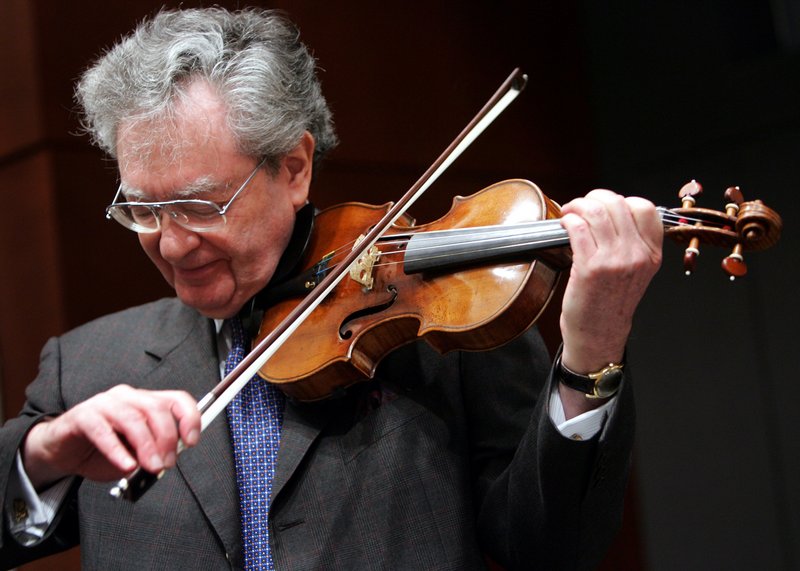BRUNSWICK — The news could hardly be considered shocking.
After all, Lewis Kaplan is the only artistic director the Bowdoin International Music Festival has ever had. He helped establish the festival, nursed it through infancy and raised it to become one of the most highly regarded classical musical festivals in the world.
Each summer, 250 students from five continents come to Brunswick, immersing themselves in the practice and performance of chamber music and solo repertoire. The faculty includes musicians representing the finest orchestras and music conservatories the world over, and the concerts that happen throughout the summer create moments of musical clarity that border on stunning.
Kaplan, who turns 80 in November, will step away from his post at the conclusion of the 2014 festival. He will help the festival’s board choose his successor, and will stay as involved in the festival as the board and his successor would like.
For all those same reasons, the news of Kaplan’s departure one year hence is a big story this summer at Bowdoin.
Kaplan is nothing if not legendary. The festival’s board chairman, James T. Morgan, described Kaplan’s achievements as “towering.”
That’s apt and accurate.
He created a festival of international stature on a small campus in a small town on the coast of Maine, a long way from any major metropolitan area. For many years now, no matter where he travels on the international stage, Kaplan meets musicians who received their training at Bowdoin.
Indeed, the Bowdoin festival and the musicians it has nurtured may very well be Maine’s best-known artistic export.
He came first at the invitation of co-founder Robert Beckwith, who wanted Kaplan and his Aeolian Chamber Players to perform. That was in June 1964. During that visit, Beckwith asked Kaplan if he would help organize a festival on an annual basis.
The Bowdoin festival accepted its first students in 1965 and began commissioning new work, a traditional that continues today.
It has trained thousands of musicians and composers, and hosted hundreds of concerts by the biggest and most influential names in classical music, including George Crumb, Elliott Carter, Arthur Fieldler and Emmanual Ax.
Teaching faculty have included the first chairs from the New York Philharmonic, the Boston and Chicago symphonies, the Philadelphia and Cleveland orchestras, conservatories worldwide and many of the premier quartets.
I sat down with him for a cafeteria lunch — he chose a salad and open-face cold-cut sandwich — at Coles Tower last week to talk about his time at Bowdoin, and to gauge if he was feeling any remorse or hesitation about his decision.
The short answer: Not at all.
He seemed relaxed and genuine, and said he was having a ball planning his farewell summer next year, which will be the 50th anniversary of the festival. He has commitments from many performers and faculty, and is busy lining up more. He intends to make next summer’s festival one to remember — not because it will be his last, but because it will be Bowdoin’s 50th. That is cause for celebration, he said.
“I wanted to go out on top of my game and when I wanted to do it,” he said, explaining his decision to step aside. “People tell me, ‘Stay another 10 years. You’re still young.’ But this timing feels right.”
A violinist, Kaplan’s resume is bright with many stars. He is a senior member of the violin and chamber music faculties of The Juilliard School, The Mannes College of Music, and visiting professor of violin at the Royal College of Music in London.
He taught for 20 years at the Mozarteum Summer Academy in Salzburg and has given master classes at most major conservatories in Europe and Asia.
In retirement from Bowdoin, he will continue with all his other commitments, at least for now.
And to be sure, he intends maintain a presence at Bowdoin in his retirement. He and his wife, Adria, have a house on Maquoit Bay in Brunswick, and they will spend plenty of time up here. He will be in the audience, if not on stage.
He’s a smart man. When I asked why the Bowdoin festival has become so renowned, he smiled and answered, “Because of my wife. She has been totally involved from day one with making people feel wanted and identifying people who could be helpful to the festival.”
He also is perceptive. He knows that people are going to want to honor him next year. And though he does not intend to participate in the planning of such honors, he will be gracious in accepting them.
“Never in 49 years have I had a concert in my honor,” he said. “After all this time, I won’t feel uncomfortable standing up saying thanks.”
Staff Writer Bob Keyes can be contacted at 791-6457 or:
bkeyes@pressherald.com
Twitter: pphbkeyes
Send questions/comments to the editors.




Success. Please wait for the page to reload. If the page does not reload within 5 seconds, please refresh the page.
Enter your email and password to access comments.
Hi, to comment on stories you must . This profile is in addition to your subscription and website login.
Already have a commenting profile? .
Invalid username/password.
Please check your email to confirm and complete your registration.
Only subscribers are eligible to post comments. Please subscribe or login first for digital access. Here’s why.
Use the form below to reset your password. When you've submitted your account email, we will send an email with a reset code.